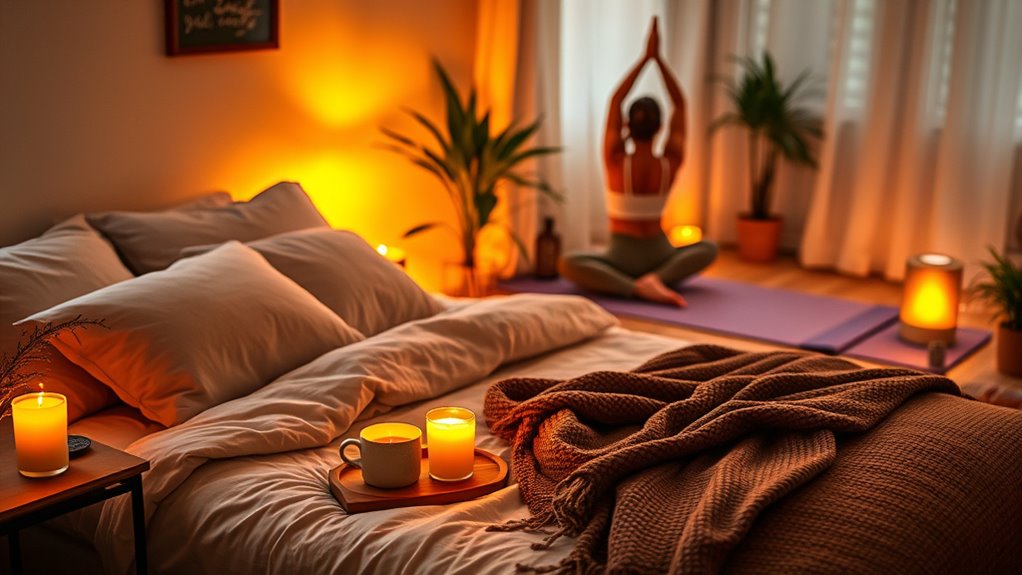To build an effective evening routine that supports better sleep and growth, start by setting a consistent bedtime and winding down with relaxing activities like gentle stretching, deep breathing, or meditation. Turn off screens at least 30 minutes before bed to reduce blue light exposure, then create calming cues such as dim lighting or journaling. Establishing these habits helps your body prepare for rest and stimulates growth hormone release—discover more ways to optimize your night routine below.
Key Takeaways
- Establish a consistent nightly routine that signals the body to prepare for sleep and supports circadian rhythm alignment.
- Incorporate mindful relaxation techniques like deep breathing, stretching, or meditation to reduce tension and promote calmness.
- Implement a digital detox at least 30 minutes before bed by turning off screens to minimize blue light and melatonin disruption.
- Engage in calming activities such as reading a physical book or listening to soothing music to create sensory cues for rest.
- Maintain a regular sleep schedule and create a tech-free zone to enhance sleep quality and support physical growth during rest.

Establishing a consistent evening routine is essential for improving sleep quality and supporting physical growth. When you create a calming nightly ritual, your body and mind can shift smoothly from the busyness of the day to restful sleep. One of the most effective ways to do this is by practicing mindful relaxation. Instead of rushing through your evening or allowing stress to build, take deliberate steps to unwind. Focus on your breathing, pay attention to physical sensations, and let go of racing thoughts. This mindfulness helps signal to your brain that it’s time to wind down, making it easier to fall asleep and stay asleep longer.
A key part of mindful relaxation is reducing stimulation before bed. That’s where a digital detox comes into play. Screens emit blue light, which interferes with melatonin production—the hormone responsible for sleep. To promote better sleep and growth, set a specific time each evening to turn off devices like smartphones, tablets, and computers. Instead, opt for relaxing activities that don’t involve screens, such as reading a physical book, journaling, or listening to soothing music. This shift not only minimizes blue light exposure but also helps your mind detach from the stresses or distractions of the digital world. When you create a tech-free zone at least 30 minutes before bed, your brain can better transition into a restful state.
In addition to limiting screens, incorporate calming activities that enhance mindful relaxation. Gentle stretching, deep breathing exercises, or meditation can help release tension accumulated throughout the day. These practices foster a sense of calm and grounding, which is crucial for a good night’s sleep. Consistency is key—try to follow the same routine every evening, so your body learns to anticipate rest. For example, you might start with a few minutes of mindful breathing, then read a physical book, and finally dim the lights to signal that it’s time to sleep. Over time, this routine becomes a cue for your body to produce the hormones necessary for growth and repair during sleep. Additionally, establishing a consistent sleep schedule supports your body’s natural circadian rhythms, further enhancing sleep quality and overall health.
Frequently Asked Questions
How Long Should My Evening Routine Last?
Your evening routine should last about 30 to 60 minutes to promote bedtime consistency and allow relaxation techniques to work effectively. Keep it short enough to wind down gradually, avoiding overstimulation. Incorporate calming activities like reading or meditation, and stick to a consistent schedule each night. This helps signal your body it’s time to sleep, improving sleep quality and supporting growth. Adjust the duration based on what relaxes you best.
Can I Include Screen Time in My Night Ritual?
Yes, you can include screen time in your night ritual, but keep it within screen time limits to avoid disrupting your sleep. Opt for relaxing activities like reading or listening to calming music instead of engaging with screens right before bed. This helps your mind unwind and prepares your body for restful sleep, ensuring your evening routine promotes growth and relaxation without overstimulating you.
Is It Okay to Vary My Routine Nightly?
Yes, you can vary your routine nightly, but aim for routine consistency to promote better sleep and growth. Incorporate some nightly flexibility to keep things interesting, but avoid drastic changes that might disrupt your sleep patterns. Small adjustments are okay, as they help your body adapt without losing the benefits of a steady routine. Find a balance that keeps you relaxed while maintaining overall structure.
What Are Some Quick Activities to Unwind?
A quick activity to unwind is like hitting pause on a busy day. Try deep breathing exercises or gentle stretching to promote stress relief and relaxation techniques. You can also listen to calming music or do a brief meditation. These activities help clear your mind, lower tension, and prepare you for restful sleep. Incorporating even a few minutes of these simple practices can make a big difference in your nightly wind-down routine.
How Early Should I Start Winding Down?
You should start winding down about 30 to 60 minutes before your scheduled bedtime. Maintaining bedtime consistency helps regulate your body clock, making it easier to fall asleep. Incorporate relaxation techniques like deep breathing or gentle stretching during this time to signal your body it’s time to relax. By starting early, you give yourself enough time to unwind fully, promoting better sleep and overall growth.
Conclusion
Creating a calming evening routine can markedly improve your sleep quality and support growth. Studies show that establishing consistent bedtime habits boosts melatonin levels by up to 50%, helping you fall asleep faster and stay asleep longer. By turning off screens, practicing relaxation techniques, and sticking to a schedule, you set yourself up for restorative rest. Start tonight—your body and mind will thank you for it, and you’ll wake up feeling more refreshed and ready to grow.









